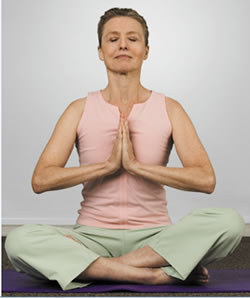
Before we begin, let's talk a bit about the mind. The mind is made up of wave patterns. When we think, it causes wave patterns to occur in the brain. There are four main types of brain waves. The pattern we are normally in when awake and thinking is called "beta wave" or "beta state." When we are dropping off to sleep and the mind begins to quiet, that is "alpha state." When we are asleep or quietly meditating, that is "theta state." The deepest state of sleep or of meditation (where there is no body awareness) is called "delta state."
The goal in meditation is to get you to the theta/delta stage. I have found that the breath meditation technique is one of the most effective ways to get to the deeper levels of meditation and still the mind. Most people who are new to meditation and are trying a variety of ways to meditate will vacillate between the beta and alpha states in their initial practice. These stages of meditation are relaxing and a wonderful experience, but as with all things in life, the more you practice, the better you will get. Eventually you will desire to quiet the mind at the theta/delta levels and will go to the deeper realms of meditation to achieve this stage.
Now let's talk about this effective and helpful way to quiet the mind, called "breath meditation." It can also be the most challenging way, because although it's simplistic, it is not always easy to do. It is easy to learn but sometimes difficult to practice.
In this form of meditation, you simply "follow your breath." Just observe your breathing with no mantra, no prayer word, just simple and quiet noticing of the breath. How it works is that you sit up straight in a quiet, comfortable place with your feet on the floor or legs crossed. As you sit there, watch or take notice of your breath. Breathe in, breathe out, breathe in, and breathe out. You can breathe in through your mouth or your nose, it doesn't' matter. The only thing that matters is paying attention to your breath.
If something distracts you, simply come back to your breathing. When strenuous or uncomfortable thoughts arise (come to the surface), don't try to ignore them or push them away but instead acknowledge them and go back to observing your breathing. Allow your attention to focus on that. Acknowledge any distractions, without being annoyed by them, and simply direct your awareness back to your breath. Eventually, thoughts will diminish, your mind will get quiet, and your brain patterns will begin to be at those deeper levels. You will find a deep peace that you may have never experienced before. Stresses will dissolve, and a sense of well-being will envelop you.
I encourage you to try the breath meditation and to practice it often. I also strongly suggest you meditate twice a day, once first thing in the morning and again just before bed at night. I find these times to be the easiest to make into a habit. We can meditate any time of the day or night, but it's best to make a point of doing it twice daily and to establish a routine of morning and evening meditation. A sense of peace will develop in your life with regular practice. In my experience, breath meditation is one of the most powerful meditations in the universe.
No comments:
Post a Comment